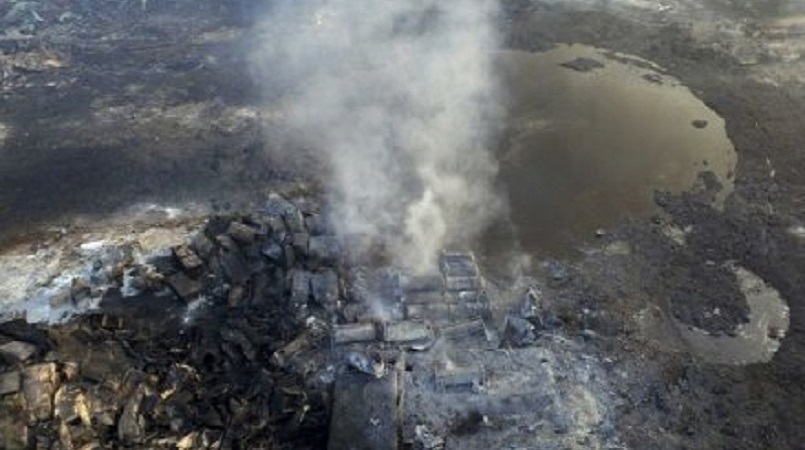
Fresh explosions in Tianjin are hampering search efforts at the site of Wednesday's huge blasts that have killed more than 100 people, as China rushes to evacuate residents over fears of spreading chemicals.
Fresh explosions are hampering search efforts at the site of Wednesday's huge blasts in Tianjin, as China rushes to evacuate residents over fears of spreading chemicals.
Police have confirmed the highly toxic substance sodium cyanide was found at the site, but a complete list of chemicals is yet to be identified by authorities.
More than 100 people have been confirmed dead and authorities fear for those who remain near the site.
"Out of consideration for toxic substances spreading, the masses nearby have been asked to evacuate," state-run Xinhua news agency said.
Police confirmed the presence of the chemical, fatal when ingested or inhaled, "roughly east of the blast site".
It did not say how much had been found or how great a risk it posed, but residents expressed concern about the air and water.
"I can't smell anything strange at this stage but the sky doesn't look as good as yesterday," said 30-year-old Wang Huajing, who was displaced by the disaster.
The Global Times, a state-run newspaper, said authorities were preparing to use a hydrogen peroxide solution to neutralise the sodium cyanide at the site.
The Taida Second Primary School, one of 12 temporary shelters, was evacuated after local police ordered a three-kilometre exclusion zone.
Officials from the National Health and Family Planning Commission of China suggested the evacuees wear long trousers and face masks.
About 6,300 people had been put up in temporary shelters, including Taida Second Primary School, as of Friday.
The death toll has risen to 104 with 721 people hospitalised, including 25 critically and 33 in a serious condition.
A 50-year-old man was found alive by firefighters just 50 metres away from the epicentre of the explosion, having survived for three days in a shipping container, state media reported.
The man was suffering from a burnt respiratory tract, but was said to be in stable condition while being treated at a hospital.
Shockwaves from Wednesday's devastating blasts were felt by residents in apartment blocks kilometres away in the city of 15 million people.
Among the dead were 21 firefighters, Xinhua said, calling it possibly the highest death toll among fire crews since the founding of the People's Republic of China in 1949.
The explosions at city's port district — the world's 10th largest — were so large they were seen by satellites in space and registered on earthquake sensors.
Chinese president Xi Jinping issued a statement on Saturday warning authorities to learn the "extremely profound" safety lessons highlighted by the tragedy.
Firefighters may have contributed to explosions: chemicals expert
China defended firefighters who initially hosed water on a burning warehouse, a response foreign experts said could have contributed to the explosions.
The warehouse, designed to house dangerous and toxic chemicals, was storing mainly ammonium nitrate, potassium nitrate and calcium carbide at the time, according to police.
Xinhua said several containers in the warehouse caught fire before the explosions.
Chemical safety experts said calcium carbide reacts with water to create acetylene, a highly explosive gas.
An explosion could be caused if firefighters sprayed the calcium carbide with water, they said.
David Leggett, a chemical safety expert based in California, said the acetylene explosion could have detonated the ammonium nitrate.
The two blasts were about 30 seconds apart, the second much larger than the first.
"In my mind, the presence of ammonium nitrate makes it easier to explain the level of devastation," he said
Lei Jinde, the deputy propaganda department head of China's fire department, a part of the Ministry of Public Security, told state-backed news website ThePaper.cn the first group of firefighters on the scene used water.
"We knew there was calcium carbide inside but we didn't know whether it had already exploded," he said.
"At that point no one knew, it wasn't that the firefighters were stupid," Mr Lei said, adding that it was a large warehouse and they didn't know the exact location of the calcium carbide.
One of China's state newspapers the People's Daily said inaccurate records were also slowing down official efforts in determining the full list of chemicals stored at the warehouse.
Chinese authorities came under criticism from bereaved families of missing reservist firefighters who tried to gatecrash a media conference.
The relatives said they had been left in the dark about the whereabouts of their relatives, who responded to the emergency.
Xinhua identified the owner of the warehouse as Tianjin Dongjiang Port Ruihai International Logistics and the China Daily newspaper said its manager had been detained.
The company said on its website it was a government-approved firm specialising in handling "dangerous goods".
Phone numbers listed on the site were disconnected.
Thousands of cars damaged, port operations disrupted.
Industrial accidents are not uncommon in China following three decades of fast growth.
A blast at an auto parts factory killed 75 people a year ago.
Foreign companies were assessing damage to facilities in and around the port, a gateway to north-east China, which accounts for about 40 per cent of China's imported cars, Xinhua reported.
French carmaker Renault said its warehouse at the port sustained severe damage and an early estimate showed nearly 1,500 of its cars there were burned.
Japan's Toyota Motor Corp said more than 50 of its employees were injured.
Mining giant BHP Billiton said its port operations and shipments were disrupted but its iron ore discharging berth was not damaged.
Oil tanker arrivals and departures were also disrupted.
